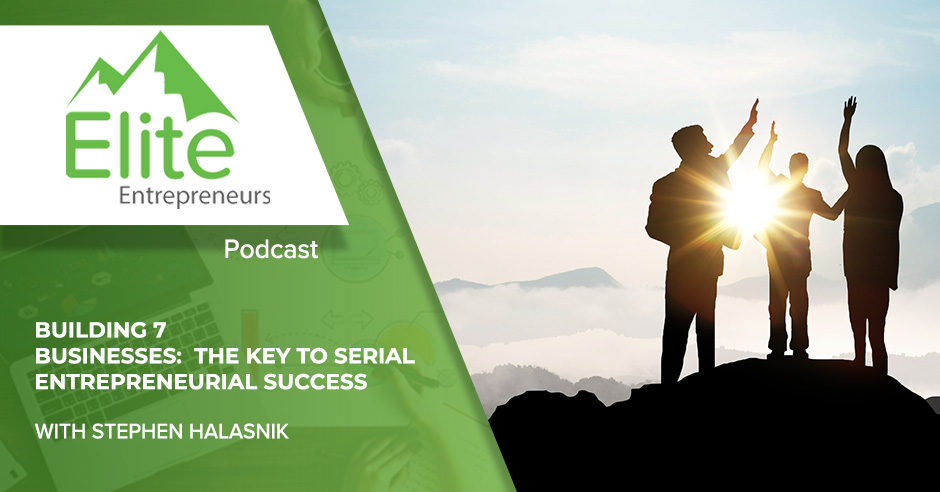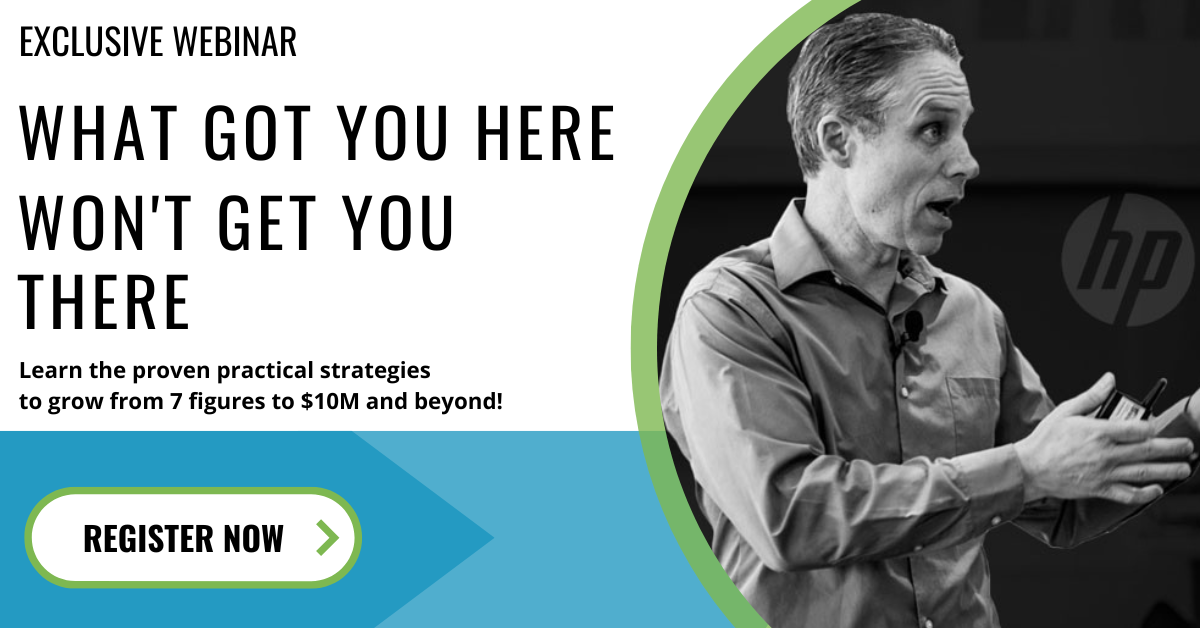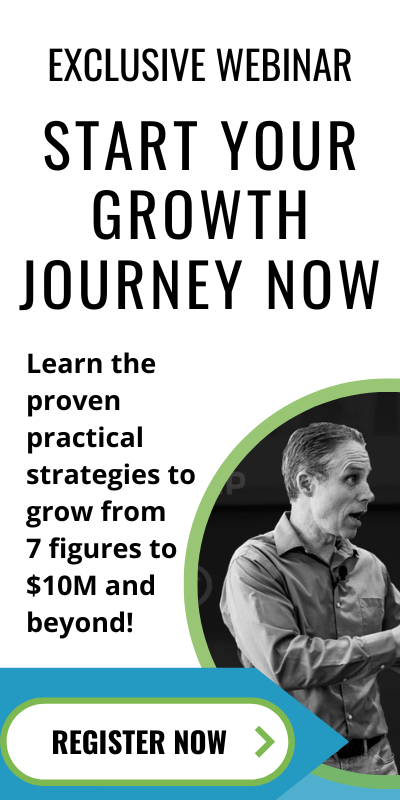Episode 151: Building 7 Businesses: The Key To Serial Entrepreneurial Success With Stephen Halasnik
Success in serial entrepreneurship isn’t just about building companies, it’s about building the right culture and hiring the right people for exceptional results. In this episode, we sit down with Stephen Halasnik, a serial entrepreneur who has built not one, not two, but seven successful companies, with revenues ranging from $5 million to a whopping $25 million.
What the podcast will teach you:
- How picking the right industry can make all the difference in your entrepreneurial journey.
- Why hiring the right people is one of the most crucial aspects of building a thriving business.
- Creating a company culture that thrives on excellence and exceptional results.
- The importance of delegating effectively and creating space for strategic thinking.
Resources:
- Elite Funeral Funding: https://elitefuneralfunding.com/
- Healthcare Seeker: https://healthcareseeker.com/
- Financial Solution: financingsolutionsnow.com
- Grow With Elite: financingsolutionsnow.com
- Email: Steveh@FinancingSolutionsNow.com
Join us on this episode as we dive deep into the entrepreneurial mindset and the keys to building thriving businesses. Tune in now.
—
Watch the episode here
Listen to the podcast here
Welcome, everyone. Like always, we have an amazing guest with us. I have to pinch myself every time of the number of people who’ve said yes. Not just people but amazing business owners and entrepreneurs who have scaled businesses say yes to come and share their stories with all of us, and share some of their insights and the lessons that they’ve learned. I get to introduce to you our guest. His name is Stephen Halasnik. He is a serial entrepreneur. I’m going to share with you that over the last 25-plus years, he’s built seven companies. His bio says six, but it’s seven now. Those companies have ranged in revenue from $5 million to $25 million with two of those companies making it on the Inc. 500 Fastest Growing lists. Welcome to the show, Stephen. Thanks for coming.
It’s great to be here. I’ll tell you why my bio says six. A long time ago, I made up the bio and I forgot a company that I built, and I haven’t changed it. Seven is the accurate number.
I have eight children. You don’t know that about me.
You forget one.
I forget one sometimes, so I get that. You just forget. That’s awesome. There are so many businesses you’ve built that you forgot one. Let’s talk about the businesses that you have built. We won’t get into each one of them, but what a cool entrepreneurial journey you’ve been on to build many, multiple seven-figure businesses and even eight-figure businesses. We’re thrilled to have you on the show and learn from some of your experiences. Before we start, is there any context you want to give about any of the current things that you’re actively working on? That would be fun for you to share and fun for our audience to get who this guy is and what businesses he has.
I do podcasts too. When someone tells you they’ve built seven companies, you’re like, “Yeah, right.” You’re thinking they are $100,000 businesses or something like that. That’s why in my bio, I make sure I say the revenue. I say two of those made it to Inc. 500 Fastest Growing Companies because that is tangible that you can prove. You’re not going to look at my financial statements, but the fact that I made two Inc. 500 fastest-growing companies in the United States and that you can Google that says a lot.
The three companies I have right now are important because they’re an accumulation of the four that came before them. In other words, I learned a lot through the other four companies enough to create the companies that have been great for me. I’m not going to start any more businesses. I don’t have to because the three companies I have right now are really good. One provides lines of credit to small businesses. I know small businesses and I’ve built them myself. I’ve dealt with banks constantly for over 25 years. That’s a nice fit.
You know how essential it is for a business to be successful to have that lifeblood of cash or that access to fuel. That’s cool.
That company is called Financing Solutions. The other company I have is called Elite Funeral Funding. I have a business partner in two of these businesses. We buy life insurance policies when someone passes away so that the family can get the money upfront instead of having to work and wait for 45 days to collect the money from the funeral home. They often need the money to pay for the funeral. That’s why. I own a very large commercial real estate building that I rent out. That’s another business right there. Those are the three businesses I have right now.
Two that have to do with financing solutions for different audiences. The other is one of the best investment types of things out there. That is real estate. We all know that. You’re involved in that game as well. That’s amazing. You’ve built all these businesses, multiple seven-figures in each of those businesses. At least one is well into eight figures. You’ve learned a lot. Why did you decide to build several businesses? Some people start one and they just grow with that one. They get to a point where they’re happy and just stick that one out until they exit, and then they’re done. For some people, it’s like, “I’m going to do that again.” For you, why multiple businesses?
Brett, you don’t know me that well. You were on my podcast. If you had to guess why, based on your experience. You’re going to be wrong. I’m setting you up here. I’m setting everybody up here. What would you think the reason being? What is the most obvious that you hear about serial entrepreneurs? Why do they do it over and over again?
I’ll play along. I like being wrong. It happens to me often. I don’t know you well. You’re right about that. We did spend some time together on your podcast. The focus was more on me in that podcast. I would say from the little that I got to know you during that podcast, you seem to be always learning and growing. You surround yourself with great people and other entrepreneurs. It seems like you probably lack the pursuit of mastery around building businesses. I see you learning everything you can, tapping into other mentors, and other peers who can help you. I guess maybe you learned some things with businesses 1 and 2 that you wanted to try again with 3, 4, 5, and 6. How wrong was I?
That was the answer I was expecting. Most people who are serial entrepreneurs are good at building. They’re good at coming up with the idea. They’re not great on the execution side. They love the thrill of building a company up to a point where you can sell it or you can turn it over to something else, or something like that. I had a multitude of reasons why I’ve done seven businesses. Let’s take each one so we can learn a lesson from each situation.
The first thing is I am good with change. I’m excellent at it. In many regards, I embrace it. The first company I started was a digital printing company. This was almost 30 years ago. Digital printing was unheard of. Digital printing was the ability to print full-color beautiful brochures on-demand which you couldn’t do before. I got in that business and the equipment that I was going to need was going to be $1 million each. You need two of them so $2 million. I never let money stop me. Of course, I didn’t have $2 million, but no one is going to pay cash for it.
I said, “Let me get into this business.” We broker the work out to people who have that equipment. I will see if I can have the cashflow. If I can make sales, people are willing to pay for it, and I can make money, I’ll go buy the equipment. It’s simple enough. I was in that business for two years and made $60,000 a year, which 30 years ago is $120,000 now, but I saw that I didn’t want to be in the printing business. It’s just not a good business for me, and nobody was making money in the digital printing industry. The people who had the equipment were baiting and switching. The clients would come in through that digital printing, and then they would do all these other types of printing.
The people who owned printing companies were not very sophisticated businessmen. There might have been an opportunity, but I didn’t like the industry. I also thought that printing was going out of business anyway in general. Everything was going digital. I moved on because I had identified that it was not a good industry to be in. I reduced my risk. I learned about it, and then I moved out because it wasn’t for me. That’s the first one.
Is that the one you forgot?
No. I forgot a credential agent, which we’ll get to that in a little bit. Unfortunately, this is going to be a long-winded thing. I’ll try to make it short. The second company was a company called ExpertSeeker.com. What we did was we placed high-end technology consultants into Fortune 500 companies on long-term consulting assignments. They would bill out at about $200 an hour, and we would pay them about $110 or less an hour or whatever it was.
It was a great business. It got to about $6 million in sales, but I knew I had a perfect storm, which was the year 2000 bug was coming. That’s what was happening where people had a fixed code. There was something called Enterprise Resource Planning software being installed in corporations, which were $45 million to $100 million projects. They needed consultants for that. You had no work going overseas yet in IT. I don’t remember the years, but I started in 1992 or 1993 or something like that. It had an eight-year run even after the year 2000. I knew work was going to go overseas. I knew the year 2000 bug was going to take consultants but eventually, they weren’t going to need them anymore. The ERP software projects wound down.
I knew I had a limited time to make as much cash on that. I tried to pivot that business, and that meant trying to find something else that that business could do. It was hard. I thought I could get into it. I said, “Just let me get into a business and then I can learn and pivot.” Now that’s well thought out. Back then, pivoting wasn’t a term.

Serial Entrepreneur: To pivot a business meant trying to find something else that that business could do.
Before the year 2000, everyone was saying, “You need to get to the $10 million mark for other companies to be interested in buying you.” Also, I was very involved in that business. That’s not a good sign for somebody to buy you. The owner should not be involved in the business. They’re not buying me. They’re buying the business. I’ve acquired a lot of knowledge in the high-end staffing business. It’s temporary staffing, which I liked the cashflow. I said, “Let me do this. Instead of looking for a different company to start in a different industry, let me start another staffing company.”
I created an umbrella company called Atlas Human Capital, and I started a company called HealthcareSeeker.com, which placed registered nurses at hospitals throughout the United States. These are called travel nurses. They go to work in Alaska for thirteen weeks and stuff like that. It was a specialty. I started that in conjunction with Healthcare Seeker. I also thought, “I could probably move into Legal Seeker with paralegals and all sorts of stuff like that.
Expert Seeker started to go down in revenue and Healthcare Seekers sputtered. Finally, Expert Seeker started to go down to almost zero and Healthcare Seekers started to take off. Expert Seeker wasn’t worth it anymore. Too much work was being sent overseas so I just focused on Healthcare Seeker. I got that to $11 million. That was one of the companies that made it to the Inc. 500 Fastest Growing Companies. I was at 499, so I just made it.
I got into the healthcare business because I thought it was recession-proof. I later learned my business was not. The 2008 recession hit and the industry went from a $13 billion industry down to a $7 billion industry. When I was doing Expert Seeker, I did so well financially that I bought a very large commercial building. Part of it is for my company and the other parts of it I rented out. That was another business. Healthcare Seeker gets to $11 million, but then it starts to go down. It goes from $11 million to $7 million to $5 million to $3 million and gets down to $1 million. I tried to stay in there because I knew that there was going to be a recovery at some point, but it didn’t recover. I couldn’t take it. I stayed at $1 million for three years and I couldn’t take it anymore.
While I was doing Healthcare Seeker, this is my favorite company that I started next, but it didn’t work, unfortunately. If I had done some more things, I would’ve been good because it was my best idea ever. It was called Credential Agent. It was software that helped other organizations stay on top of employee credentials. Think of a hospital and let’s say they have 2,000 nurses. Every single nurse has twenty credentials that go out of date at some point, licenses, certifications, immunizations, and all this stuff. They were managing them with Excel spreadsheets. It was crazy. I started a company that had software that would allow notification of the nurses to easily manage those types of things. It was a great idea.
The hard part about that idea, you’re going to find this scary, was that the hospitals didn’t care if a nurse’s immunizations, background checks, and all that stuff were out of date, and they still don’t. It’s really bad. I don’t get it. That company stayed in business for a very long time, making me $10,000 a month or something like that in residue.
It stayed in business for a long time, but I missed the wave a little bit in that people came in with my idea and they did it a lot cheaper. I’m not going to get into the reason why I couldn’t do it, but I couldn’t go much cheaper than I was going at. I finally closed down Healthcare Seeker. My business partner and I became very good friends. I had been friends with a great guy who sold his business. He’s super smart. We started looking at Angel funding deals together. That’s what entrepreneurs do.
When you have some capital, entrepreneurs get together and they start investing.
One of the hardest things in business is coming up with a good idea. Execution is next. If you can’t come up with a good idea yourself, you try to find somebody else who has. We tried that for three years. My business partner’s name is Keith. He and I never found a business that we thought we liked. We looked at thousands. We almost came close to one, but then the owner scared us, so we didn’t do it.
One of the hardest things in business is coming up with a good idea. Execution is next. If you can't come up with a good idea yourself, you try to find somebody else who has. Share on XWe then stumbled upon the alternative financing business, which is Financing Solutions, which we started twelve years ago. It’s been a great business for us. We understand it. It’s been a good business for us. We use our own capital. Banks won’t loan money. It’s a good business. The one thing about Financing Solutions is it may not be a sellable business because to do the business, you have to be involved and you have to have this knowledge that we have. It’s very hard to standardize what we do. Some companies do it, but we have a uniqueness to it because we’re using instincts a lot.
About a couple of years into Financing Solutions, my business partner and I decided that we both had lived through recessions and what it does to a business. We were worried about what a recession would do to the financing industry. We searched and found this industry, which is very mature, called Funeral Funding. I started the Elite Funeral Funding.
The reason why I’ve started seven companies is sometimes because I realized that there wasn’t an industry or a business there. Other times, the business ran its course. Believe me, I’ve seen so many entrepreneurs hold on, thinking that what they’re doing is going to work. They’re hitting their head against the wall because it’s not there. I don’t care how well you execute it. I’ve had other businesses get caught up in terrible things outside my control like recessions.
Elite Funeral Funding is going to be a sellable business at some point, which is great. It will be my first sale, so to speak. The commercial building will be for sale. I’m sorry, the financing business. I’ll be able to do it as long as I want. I work 25 hours a week right now. I’m 58 and I’m happy to do a little bit of business still, and I’ll do that until either my business partner doesn’t want to or I don’t want to. That’s the plan.
In some of those businesses, this is with Expert Seeker and Healthcare Seeker, instead of me saying, “I’ll get one company to $25 million or over $10 million. Maybe I can get a couple of them.” That way I’ll have to get over that magic mark of $10 million so that people would be interested in us at that point. The thing that I learned now after 30 years is it’s important to pick the right industry to go into. I’ve seen bad businessmen who do well because of the industry they’re in.
They catch the wave. I did that with Expert Seeker. I caught the wave. Nobody could do badly in that business. I’ve seen the opposite too. I’ve seen good business people who execute incredibly well. I’d rather have that person. By the way, that’s a better business person, a person who gets into an industry and just executes. They’ll do good in any industry. Now I found good industries to be in, and so far over twelve years for Financing Solutions, and six years for Elite Funeral Funding, and real estate has done okay.
That's a better business person. A person who gets into an industry and just executes. They'll do good in any industry. Share on XAlthough I would tell you that my business partner is really smart. We both say that if we had to do it all over again, we would’ve gone bigger. Knowing what we know now and knowing how good we are at it, we would’ve gone for something bigger where we would’ve built a $100 million company or something big. It’s nice to have a yacht. My dream would be to have a $500 million yacht to live on the water. Of course, with that comes pain.
There are new levels of things to deal with. Stephen, you have a lot of experience building businesses. You’ve shared some already about industry choice and good execution and that kind of stuff. Let’s talk about the businesses where you had the most people if you don’t mind. The businesses where you had the most people, what you had to learn, going from hustling, doing, grinding it out, to setting a vision for aligning, leading people, and that sort of thing. I’d love to hear any lessons around that that you’d be willing to share.
In my view, there are three types of workers in a business. You have the leader, the manager, and the worker bee. Early on that owner is all three of those things. As the business grows, maybe the owner is not the worker. You don’t have a second in command and the owner is the entrepreneur and the manager. Nobody is good at that. If you are beating yourself up because you think, “I’m so frustrated with my people,” it’s because you’re doing too much. You’re managing people and you’re trying to be a leader and a strategic thinker.
My advice here and this is going to sound strange. You have to become a better manager just to get to the point where you can hire a second in command, which is the ultimate goal. To get to the point where you can just do strategic vision and then you have everything else. Things will get easier in your life if you can do that.

Serial Entrepreneur: The ultimate goal is to get to the point where you can just do strategic vision and then you have everything else. Things will get easier in your life if you can do that.
I did a smart thing with Healthcare Seeker. I was at $3 million. I didn’t feel I could afford a second in command yet. I took one of my best people who I thought would also be a good manager. I made her a captain, like on a baseball team or a football team. I said, “I’m going to pay you a little extra. You’re going to be the captain, but these are some of your new responsibilities, which is to manage some of these people to watch them watch over them.” That allowed me to get more in a strategic role.
That gave you some space.
It did.
Whether it’s additional cycles because of a team member that we elevate or somebody we bring in, a lot of business owners now are familiar with the idea of a fractional leader. Even bringing in a fractional leader might free up some space for you to be more strategic and work on the business. There are lots of ways, but we’ve got to find ways to get out of the doing and managing into more of the leading. I love that you shared that.
This is a fact. I don’t have to be the guy who does everything. I’m not a control freak. Sometimes it’s good enough. If we win, I don’t care who gets the credit. People drive me crazy because they’re so involved. I used to go on vacations with my friends who are business owners. They’d be checking their email every five seconds. He’d look at me and they’re like, “Aren’t you worried about the business?” I’m like, “No. If I have to look up my phone every five seconds, I have a crappy business.”
I love that perspective. It’s so telling. When people are away from the business, are they really away from it? Can the business stand without them? If not, they’ll have some work to do to build that up. We probably have time for one more lesson. I’ll offer a prompt and then you could say, “No, I’d rather talk about this.” One more key lesson learned as you’ve grown. The optional prompt would be as you go to find key people, whether it’s your right-hand person or another key leader that you need to bring into the business, how do you find somebody who’s going to be who you need them to be so that you can relinquish control and feel less weight on your shoulders because you have somebody so capable in there?
It’s a great question. It’s a little broader, and that is about hiring people, which is critical. With Expert Seeker, I thought I sucked at hiring people. With Healthcare Seeker, I had made it a mission to have a company of people who are good and whom I liked. What I’m telling everybody is you have to be great at hiring. The only way you do that is to read about how to interview people, read about how to have job descriptions, or take classes on managing people. What happened was I and my team became good at the process of interviewing, hiring, retaining, and finding good people. That made a huge difference in how much I liked my company.

Serial Entrepreneur: You have to be really great at hiring. The only way you do that is to read about how to interview people, read about how to have job descriptions, or take classes on managing people.
Some of the things I would do as a second in command are just off the top of my cuff. I would call my friends who have done that and say, “Tell me what you’ve learned through this process. Tell me what I should be looking for. Tell me what your job description looks like for them. What are they responsible for? How are they accountable? How do you measure them?” I’d be reading about or asking questions that I should be asking. How do I do a background check to make sure they are who they are? It’s called an anchor. There are all of these things.
You have to be an expert. You have to be the best at hiring people. Do you have a culture for your company? Do you know what your mission is? Do you know what your purpose is? Do your employees know that? That all fits into hiring the right type of people. It’s not one thing. It’s a lot of things. Some of this can be done very early in the cycle of a company. When I started Healthcare Seeker, I knew what its culture was going to be. I knew what our purpose was going to be. I knew what our goals were going to be. When I started hiring people, I shared that with them, “This is what we’re going to do.” The number one culture that I wanted out of the people that I hired was I wanted them to care about exceptional results. That’s what I looked for because I’m that way. Culture is a representative of the personality of the owner.
Culture is representative of the personality of the owner. Share on XI was smiling as you shared all of that because I want our audience to grasp the importance of getting the hiring right. I hear it all the time. It’s often the case. They think, “I know business but I don’t know all these people’s stuff. I don’t know how to set a good vision, I don’t know how to hire. I don’t know the culture. All that sounds woo woo to me or whatever.” The business owners that build great businesses learn this stuff. They figure it out like you described. Before a business owner figures out sales and marketing, they’re out there learning as much as they can about it. The way that stuff moves so fast now, we’re always learning about, “Google is doing this now, and here are good practices with email marketing, and here’s that.”
We’re programmed to learn how to keep growing and being curious about customer acquisition, but we don’t spend the same time and energy on talent acquisition. If we did, our businesses would go up. As our talent goes, so goes the business. I appreciate you drawing that out. Stephen, this has been fun, especially to have somebody who’s been at this several times and had success building different types of businesses in different markets and seasons. It’s exceptional. Thank you for making time for us.
Thanks for having me. It was fun.
If people want to learn more about any of your businesses or connect with you, what is the best way for them to do that?
If they’re looking for a line of credit, you can go to FinancingSolutionsNow.com. That’s where you can learn more about our line of credit program. If you want to reach out to me, you can email me at Steveh@FinancingSolutionsNow.com.
Thank you again for your time. It was fun.
Thanks.
—
That’s it for this episode. Please share, like, comment, rate, and do all those things so that we can help as many seven-figure business owners as possible. We want to help you grow your businesses and have the life that you want. Thanks for tuning in.
Important Links
- Stephen Halasnik – LinkedIn
- Elite Funeral Funding
- HealthcareSeeker.com
- Financing Solutions
- Steveh@FinancingSolutionsNow.com
- https://GrowWithElite.com/
About Stephen Halasnik
 Stephen Halasnik has built 6 companies over the last 25+ years in the yearly revenue range of $5 million to $25 million, with 2 that have made the INC 500 fastest growing list.
Stephen Halasnik has built 6 companies over the last 25+ years in the yearly revenue range of $5 million to $25 million, with 2 that have made the INC 500 fastest growing list.
Want to listen to more? View all episodes here >



